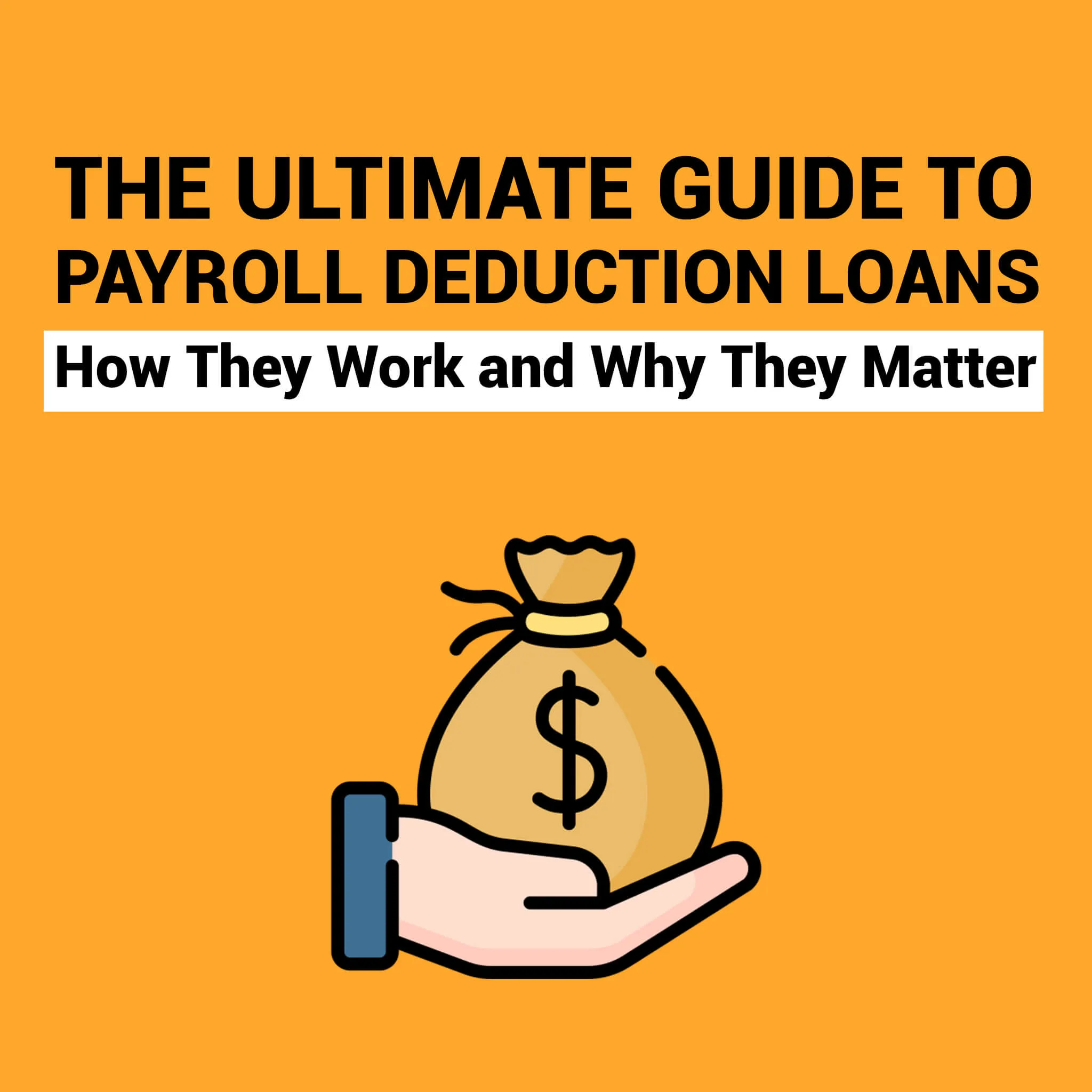Introduction
In today’s fast-paced world, financial emergencies can arise unexpectedly, leaving many individuals struggling to make ends meet. Payroll deduction loans have emerged as a popular solution to address such situations. In this comprehensive guide, we will explore the ins and outs of payroll deduction loans, including how they work and why they matter. Whether you’re a borrower seeking financial assistance or simply interested in understanding this financial tool, this guide will provide you with valuable insights. So, let’s dive in!

1. Understanding Payroll Deduction Loans
What are Payroll Deduction Loans?
Payroll deduction loans, also known as salary deduction loans or wage assignment loans, are a type of loan where repayments are automatically deducted from the borrower’s paycheck. These loans are typically offered by employers in partnership with financial institutions or credit unions. The loan amount is based on the borrower’s income, and the repayment terms are structured to align with their pay schedule.
How Do Payroll Deduction Loans Work?
When an individual applies for a payroll deduction loan, the lender assesses their eligibility based on factors such as employment history, income stability, and creditworthiness. If approved, the borrower agrees to have a portion of their salary deducted automatically each pay period to repay the loan. This automatic deduction ensures timely repayment and reduces the risk for both the borrower and the lender.
Eligibility Criteria for Payroll Deduction Loans
The eligibility criteria for payroll deduction loans vary depending on the lender and the specific requirements set by the employer. Typically, applicants must be employed by a company that offers payroll deduction loans as a benefit. Additionally, lenders may consider factors such as the borrower’s credit history, income level, and length of employment. Meeting these criteria demonstrates the borrower’s ability to repay the loan.
2. The Benefits of Payroll Deduction Loans
Convenient Repayment Method
One of the significant advantages of payroll deduction loans is the convenience they offer in terms of repayment. By deducting the loan amount directly from the borrower’s paycheck, they eliminate the need for manual payments or remembering due dates. This automated process ensures timely repayments, reducing the chances of missed or late payments.
Lower Interest Rates
Payroll deduction loans often come with lower interest rates compared to other types of loans, such as payday loans. Since the loan is secured by the borrower’s employment and paycheck, lenders face lower risk, resulting in more favorable interest rates. This benefit translates to lower monthly payments, making the loan more manageable and affordable for borrowers.
Easier Loan Approval Process
For individuals with less-than-perfect credit, obtaining a traditional loan can be challenging. However, payroll deduction loans offer a more accessible approval process. Since these loans are based on employment and income, lenders focus less on credit history. This makes payroll deduction loans an attractive option for borrowers with limited credit or those seeking to rebuild their credit score.
3. The Application Process
Finding a Lender
To apply for a payroll deduction loan, borrowers must find a reputable lender that offers this type of loan. Research various lenders and compare their terms, interest rates, and fees. It’s essential to choose a lender that aligns with your financial needs and provides transparent information about the loan terms.
Submitting an Application
Once you’ve selected a lender, the next step is to complete the application process. Typically, you will need to provide personal information, employment details, income verification, and consent for payroll deduction. The lender will review your application and assess your eligibility based on the information provided.
Approval and Disbursement
If your application is approved, the lender will finalize the loan agreement, including the loan amount, interest rate, repayment schedule, and any applicable fees. Once the agreement is signed, the funds will be disbursed to your designated bank account. From this point forward, the agreed-upon amount will be automatically deducted from your paycheck until the loan is fully repaid.

4. Responsible Borrowing Practices
Assessing Your Financial Situation
Before applying for a payroll deduction loan, it’s important to assess your financial situation. Evaluate your monthly income, expenses, and existing debts to determine if taking on additional debt is a feasible option. Understanding your financial obligations will help you make an informed decision and avoid overextending yourself financially.
Borrowing Only What You Need
While it may be tempting to borrow more than necessary, it’s advisable to borrow only the amount you truly need. Keep in mind that the borrowed amount, along with interest and fees, must be repaid within the agreed-upon timeframe. Borrowing excessively can lead to financial strain and make repayment more challenging.
Repaying the Loan Promptly
Prompt repayment is crucial when it comes to payroll deduction loans. Timely repayment not only ensures that you fulfill your financial obligations but also helps build a positive credit history. By repaying the loan promptly, you establish a track record of responsible borrowing, which can benefit you in future credit applications.
5. Payroll Deduction Loans vs. Traditional Loans
Differences in Repayment Structure
Payroll deduction loans differ from traditional loans in terms of repayment structure. With traditional loans, borrowers are typically responsible for making monthly payments directly to the lender. In contrast, payroll deduction loans automate the repayment process by deducting the amount directly from the borrower’s paycheck.
Interest Rates and Fees
Another significant difference between payroll deduction loans and traditional loans lies in the interest rates and fees. Payroll deduction loans often come with lower interest rates due to their secured nature. Traditional loans, especially those obtained with bad credit, tend to have higher interest rates to compensate for the lender’s risk.
Impact on Credit Score
Both payroll deduction loans and traditional loans can have an impact on your credit score. Timely repayment of payroll deduction loans can positively influence your credit history, demonstrating responsible financial behavior. On the other hand, missed payments or defaulting on either type of loan can negatively affect your credit score.
6. Common Misconceptions
Payroll Deduction Loans and Payday Loans
It’s essential to distinguish between payroll deduction loans and payday loans, as they are often confused. Payroll deduction loans are repaid through automatic deductions from the borrower’s paycheck, whereas payday loans typically require a lump-sum repayment on the borrower’s next payday.
Payroll Deduction Loans and Employer Involvement
Although payroll deduction loans are facilitated through employers, the employer’s involvement is typically limited to deducting the agreed-upon amount from the borrower’s paycheck. Employers do not usually have access to personal loan information or play a role in the approval process.
Payroll Deduction Loans and Credit History
While payroll deduction loans consider employment and income stability, they may still involve a credit check. However, the focus is less on credit history and more on the borrower’s ability to repay the loan through regular income.
7. Factors to Consider Before Applying
Understanding the Terms and Conditions
Before applying for a payroll deduction loan, carefully review the terms and conditions provided by the lender. Pay attention to interest rates, repayment schedules, fees, and any other relevant details. Understanding the loan’s terms will help you make an informed decision and avoid surprises down the line.
Loan Repayment Schedule
Take into account the loan repayment schedule and ensure it aligns with your pay frequency. Consider whether the loan installments will comfortably fit within your monthly budget. If the repayment terms seem challenging, it may be worth exploring alternative options or adjusting the loan amount.
Alternatives to Payroll Deduction Loans
While payroll deduction loans can be a valuable financial tool, they may not be suitable for everyone. Consider alternative options such as personal loans, credit cards, or borrowing from friends or family. Compare the terms, interest rates, and fees associated with different loan options to find the best fit for your circumstances.
8. Why Payroll Deduction Loans Matter
Financial Flexibility
Payroll deduction loans provide borrowers with financial flexibility during emergencies or unforeseen expenses. They offer quick access to funds without the need for a lengthy application process. This can help individuals navigate challenging financial situations with greater ease.
Emergency Financial Support
For individuals facing unexpected medical bills, car repairs, or other urgent expenses, payroll deduction loans can serve as a lifeline. They provide immediate financial support, allowing borrowers to address emergencies promptly and without disrupting their financial stability.
Peace of Mind
Knowing that you have access to payroll deduction loans can offer peace of mind. In times of financial strain, having a reliable and convenient borrowing option can alleviate stress and provide a sense of security. Payroll deduction loans can act as a safety net, providing reassurance during difficult times.
Frequently Asked Questions
Q1. Can I apply for a payroll deduction loan if I have bad credit?
Yes, payroll deduction loans are often accessible to individuals with bad credit since they primarily consider employment and income stability rather than credit history.
Q2. How much can I borrow through a payroll deduction loan?
The loan amount for payroll deduction loans is typically based on a percentage of your income. The specific limit will vary depending on the lender and your employer’s policies.
Q3. Are payroll deduction loans the same as payday loans?
No, payroll deduction loans differ from payday loans. Payroll deduction loans involve automatic repayment through salary deductions, while payday loans typically require a lump-sum repayment on your next payday.
Q4. Can I choose the repayment term for a payroll deduction loan?
The repayment term for a payroll deduction loan is usually predetermined by the lender based on your pay schedule. However, you may have some flexibility in choosing between different loan durations offered by the lender.
Q5. What happens if I change jobs while repaying a payroll deduction loan?
If you change jobs while repaying a payroll deduction loan, you must inform the lender and update them with your new employment information. The loan repayment will continue through the new employer’s payroll deduction system.
Q6. Can I pay off a payroll deduction loan early?
Yes, in most cases, you can pay off a payroll deduction loan early. However, it’s important to check with your lender to understand if any penalties or fees apply for early repayment. Clearing your debt ahead of schedule can save you money on interest payments.
Q7. Can I get multiple payroll deduction loans at the same time?
It depends on the policies of the lender and your employer. Some lenders may allow multiple loans as long as the total repayment amount remains within a manageable limit based on your income. Check with your lender to determine if multiple loans are an option.
Q8. Will my employer know the purpose of the loan?
No, your employer typically does not have access to the details of your loan purpose. The loan agreement is usually confidential between you and the lender. Your employer’s involvement is limited to deducting the loan repayment from your paycheck.
Q9. Can I use a payroll deduction loan for non-emergency expenses?
While payroll deduction loans are commonly used for emergency expenses, you can also utilize them for non-emergency purposes. It’s important, however, to carefully consider your financial situation and ensure that taking on additional debt is a responsible decision.
Q10. Are payroll deduction loans available in all countries?
Payroll deduction loans may be available in some countries but not universally. The availability and specific terms of these loans can vary depending on the financial systems and regulations of each country. Research the options specific to your location.
Conclusion
In times of financial uncertainty or unexpected expenses, payroll deduction loans can be a valuable resource. Their automated repayment structure, lower interest rates, and accessibility make them an attractive option for individuals seeking financial assistance. By understanding how payroll deduction loans work, assessing your financial situation responsibly, and exploring alternative options, you can make informed decisions about borrowing. Remember, it’s crucial to use these loans wisely, borrow only what you need, and repay the loan promptly to maintain your financial well-being.
N.B. Incorporating payroll deduction loans into your financial toolkit can provide you with the necessary flexibility and peace of mind when facing unexpected expenses. Whether it’s medical bills, home repairs, or other urgent financial needs, these loans can help bridge the gap and give you the necessary support. However, always exercise caution and consider your financial capabilities before taking on any form of debt. With responsible borrowing practices and timely repayment, payroll deduction loans can be a valuable asset in your journey toward financial stability.
